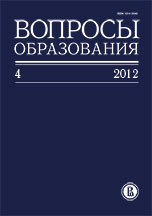"Education in 2013. Trends and Challenges". Are the Forecasts Coming True?
Abstract
Workshop ‘Modern Research and Development in Education’, Institute for Educational Studies, National Research University — Higher School of Economics, June 19, 2012.
Speakers:
Irina Abankina, Director of the Institute for Educational Studies, National Research University — Higher School of Economics;
Mark Agranovich, Executive Director of the Interregional Association for Monitoring and Statistics of Education;
Aleksandr Adamsky, Rector of the Institute of Educational Policy Problems ‘Eureka’;
Yelena Berezhnova, leading researcher of the Center for Innovative Education Models, Moscow Institute of Open Education;
Viktor Bolotov, Vice President of the Russian Academy of Sciences;
Valery Kazarin, D.Sc. in Pedagogy, independent consultant;
Anatoly Kasprzhak, Director of the Center of Leadership Development in Education, Institute for Educational Studies, National Research University —Higher School of Economics;
Tatyana Klyachko, Director of the Center for Lifelong Education Economics, Russian Presidential Academy of National Economy and Public Administration;
Tatyana Kovalyova, Professor at the Chair of Pedagogics, Moscow State Pedagogical University, President of the Interregional Tutors Association;
Sergey Kravtsov, Director of the Regional Development Department, Ministry of Education and Science of the Russian Federation;
Vladimir Livshits, Secretary of the Central Committee of the Trade Union of Public Education and Science of the Russian Federation for Economic Issues;
Yelena Penskaya, Dean of the Faculty of Philology, National Research University — Higher School of Economics;
Yefim Rachevsky, Director of Moscow High School ‘Tsaritsyno 548’;
Igor Remorenko, Deputy Minister of Education and Science if the Russian Federation;
Boris Rudnik, Director of the Institute of Public Resource Management, National Research University — Higher School of Economics;
Aleksandr Sysoyev, Professor at the National Research Nuclear University ‘MEPhI’;
Konstantin Ushakov, Professor at the Institute for Educational Studies, National Research University — Higher School of Economics;
Isak Frumin, Director of Research and Development at the Institute for Educational Studies, National Research University — Higher School of Economics;
Lyubov Tsoy, senior researcher at Moscow Institute of Open Education.
The discussion gives a retrospective view on accuracy of the forecasts made by the leading experts in education when they discussed prospects for development of the educational system in 2003 and current trends in this development. Participants of the workshop agree that mostly negative predictions have come true. The forecasts underestimated threats external to education, which have been dominating over inherent educational policies and developing into insurmountable barriers restricting implementation of efficient strategies.
Both seized and missed opportunities are discussed. It turns out that the analyzed period witnessed much less changes than the previous decade and than it had been predicted. The spotlight is thrown on possible mechanisms of changing the educational system: specifics of market laws in education; opportunities provided by proper management; young people’s motivation to change the educational system. The speakers point out that resource and time scale of the measures taken is in a huge disproportion with their expected effects. The 2020 Strategy is also viewed from this perspective. Possible resources of education development are discussed. The Internet and social networks are regarded as potential triggers of changes in the educational system. The speakers also ponder on why these changes didn’t happen over the past decade.









